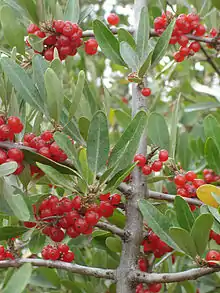Shepherdia
Shepherdia, commonly called buffaloberry[1] or bullberry, is a genus of small shrubs in the Elaeagnaceae family. The plants are native to northern and western North America.[2] They are non-legume nitrogen fixers.
| Shepherdia | |
|---|---|
 | |
| Shepherdia argentea | |
| Scientific classification | |
| Kingdom: | Plantae |
| Clade: | Tracheophytes |
| Clade: | Angiosperms |
| Clade: | Eudicots |
| Clade: | Rosids |
| Order: | Rosales |
| Family: | Elaeagnaceae |
| Genus: | Shepherdia Nutt. |
| Species | |
|
See text | |
| Synonyms | |
| |
Shepherdia is dioecious, with male and female flowers produced on separate plants.[3]
Species
The genus has three living species:
- Shepherdia argentea - silver buffaloberry[4]
- Shepherdia canadensis - Canada buffaloberry
- Shepherdia rotundifolia - roundleaf buffaloberry, endemic to southern Utah and northern Arizona
An additional extinct species is also placed in the genus:
Fruit
The berry is recognizable by being a dark shade of red, with little white dots on them. They are rough to the touch, and are found on both trees and shrubs.
Wildlife
The plants have rather bitter-tasting berries. The fruit are often eaten by bears, which by legend, prefer the berries to maintain fat stores during hibernation.[6]
Buffaloberries are used as food plants by the larvae of some Lepidoptera species, including Ectropis crepuscularia (recorded from S. canadensis) and Coleophora elaeagnisella.
As food
Buffaloberries are sour and can be made into jam, pie, jelly, syrup, soups, or prepared like cranberry sauce with sugar added.[6]
References
- USDA, NRCS (n.d.). "Shepherdia". The PLANTS Database (plants.usda.gov). Greensboro, North Carolina: National Plant Data Team. Retrieved 11 November 2015.
- "Shepherdia Nutt". USDA PLANTS.
- Renner, Susanne S. (2014). "The relative and absolute frequencies of angiosperm sexual systems: dioecy, monoecy, gynodioecy, and an updated online database". American Journal of Botany. 101 (10): 1588–1596. doi:10.3732/ajb.1400196. PMID 25326608.
- "Silver buffaloberry" (PDF).
- LaMotte, R.S. (1952). Catalogue of the Cenozoic plants of North America through 1950. Geological Society of America Memoirs. Vol. 51. Geological Society of America. doi:10.1130/MEM51.
- Elias, Professor, Thomas S. (1983). Edible Wild Plants A North American Field Guide (Digitized online by Google books). Peter A. Dykeman. Cengage Learning. pp. 9–28, 258. ISBN 0-442-22254-8. Retrieved 2009-01-25.